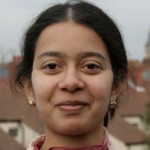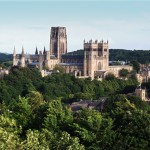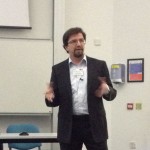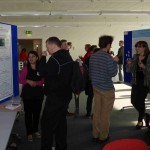18-21 March 2014, Daejeon, South Korea
article by Flynn Castles
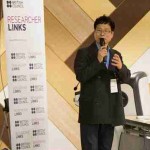
Academic co-organiser Dr Jinhae Park addresses delegates at the British Council Researcher Links Workshop on Soft Matter.
The stated aim of the British Council’s Researcher Links Workshops programme is to “bring together early-career researchers from UK and one of 18 partner countries to allow them to make international collaborations that improve the quality of their research”. In this context, early-career researchers are defined loosely as those who have been awarded a PhD within the last ten years. The subject of this particular workshop was Soft Matter: Analysis, Applications, and Challenges, and naturally included many working in the field of liquid crystals. The academic organisers were Dr Apala Majumdar (University of Bath, UK) and Dr Jinhae Park (Chungnam National University, South Korea), and the event was held at the National Institute for Mathematical Sciences in the city of Daejeon. The programme included 23 oral presentations by early-career researchers from the UK and South Korea, seven plenary talks from senior researchers, an intercultural session run by British Council, and a focused discussion on funding opportunities and future collaborations. The delegates also enjoyed a lively social programme, including a welcome dinner hosted by the British council in Seoul and a banquet hosted by the local organisers in Daejeon. With the British Council generously providing funding for travel and accommodation, the event represented an excellent opportunity for young researchers from the UK and South Korea to share their research and forge new international collaborations, in line with the programme’s aims.
From the perspective of the BLCS, it is perhaps particularly gratifying to see that Dr Apala Majumdar—who herself was a winner of the BLCS Young Scientist Award in 2012 and is currently a Reader at the University of Bath—is now involved with generating opportunities for young liquid crystal scientists in the UK and is providing leadership in the wider soft-matter community at an international level.
About the author: Dr Flynn Castles is a Research Fellow in the Department of Materials at the University of Oxford. Email: flynn.castles…at…materials.ox.ac.uk.

